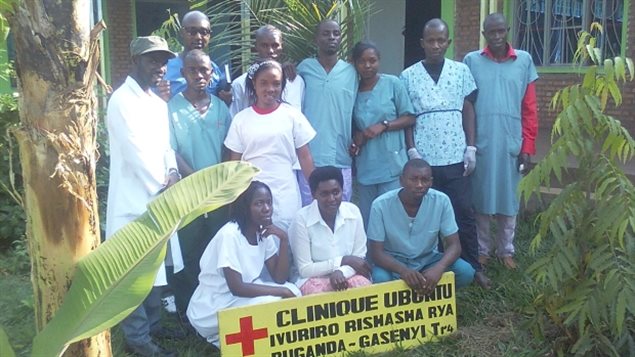Jackson Nahayo was beaten and left for dead in a forest in Burundi when he was six years old. He’d been kidnapped from school, along with his older sister, by rebel fighters during the ethnic conflict in Cibitoke province in 1992.
He protested the way the rebels were treating his sister. He told CBC News, “They made her work so hard, so I told them God would punish them.” Now 30, Nahayo says, “I guess I was the mouthy one.”
When he came-to, alone in the forest he eventually made his way to a group of people fleeing the province.
Following a life with a loving family in Winnipeg, and a nursing education, he is back in Cibitoke, trying to keep the clinic he opened two months ago, working.
“I have hope because I got lots of help along the way to build it.”
As a child he’d made it to neighboring Congo. When war broke out there in 1995, he travelled to Zambia. That’s where he met Rob Neufeld and Lois Coleman Neufeld, the Winnipeg couple he calls “my Canadian parents”.
Nahayo started school in the Mennonite Brethren Collegiate Institute in 2002, when the new family moved back to Winnipeg. When he gradutated in 2005 he learned that his sister, and other family members, were alive and living in Cibitoke province.
He describes receiving the news as the happiest moment of his life. “All this time I had a wound in my heart. It healed in 2005.”
When he returned to Burundi to reconnect with his family that summer, he said it was an eye-opening experience.
“I went back to Canada a different person.”
“I’m coming from an environment where we would throw grapes at each other in school [in Winnipeg], and here [in Burundi] I’m in a community where no one goes to school, people get sick,” he said. “I felt guilty in a way. I went back to Canada a different person.”
While studying nursing, he planted trees during the summer and worked oil rigs during the winter to raise the money to open the clinic.
By 2013 Nahayo had a container full of used medical equipment all set to be shipped to Burundi, and he was going home to be with his original family.
“It was the biggest scary thing”
“It was the biggest scary thing,” he said. “The little guy who just graduated, having this dream. But I really, from the heart, hoped that it would work.”
For the past two years, Nahayo worked constructing the building, connecting the electricity from a source two kilometres away, working with locals to provide running water, all while dealing with the government bureaucracy.
The Ubuntu Clinic opened on April 25th, 2016. With a lab and pharmacy, Nahayo says he is the only person in the area who can deal with cardiac issues, diabetes, hypertension and liver problems.
But the challenge now is medication. “We get old-school diseases like tetanus and meningitis that need heavy-duty antibiotics that cost a lot. But people can’t even afford malaria treatment, which is about $3 US.”
Already the pharmacy owes about $1000 US for medication he provided at no charge. The clinic also needs more equipment for the lab, and a refrigerator to keep the medication cool.
Nahayo says some patients disappear without paying. He could force people to work off their bills as some other private clinics do, but he doesn’t want to have to resort to this. And while he has started several community projects to employ people, he admits it’s been challenging.
He said he’s willing to come back to Canada and return to tree planting to keep the clinic open.
“I won’t let this close. I think it’s the best thing I could have done in life.”
(With files from Bridget Forbes, CBC News)







For reasons beyond our control, and for an undetermined period of time, our comment section is now closed. However, our social networks remain open to your contributions.